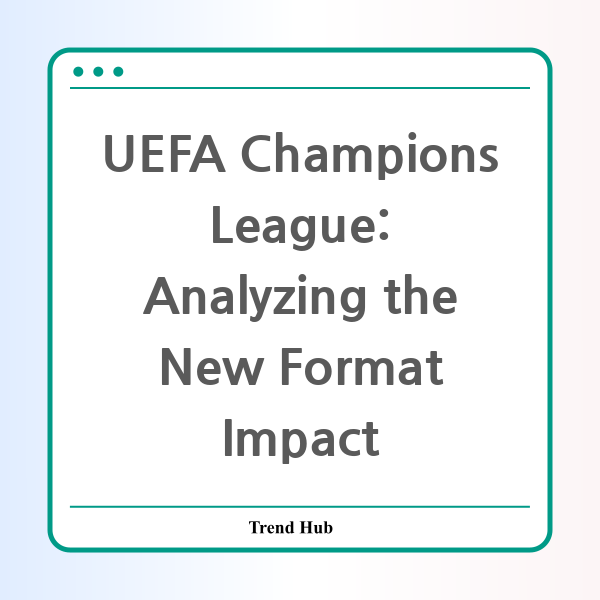* This website participates in the Amazon Affiliate Program and earns from qualifying purchases.

The UEFA Champions League has always been a highlight in the football calendar, drawing millions of fans worldwide. However, this season introduced a dramatic change to the format, with 36 teams competing in a league phase instead of the traditional group stage. Has this new approach elevated the quality and excitement of the tournament, or has it diluted the joy of Europe's premier club competition? Let’s delve into the highlights, criticisms, and nuances of this year's UEFA Champions League.
Over four months, teams battled it out over eight matches, resulting in a new landscape where only the top 24 teams continued to the knockout phase. This departure from the familiar eight groups of four was eagerly anticipated yet contentious among players, fans, and analysts alike. While some touted it as an opportunity for smaller clubs to shine, others expressed concerns about player fatigue and a lack of competitive edge early on in the tournament.
What Worked?
At its core, the new format allowed teams like Celtic and Aston Villa to experience success on a larger stage. For them, securing a place in the knockout rounds was a dream come true, showcasing their abilities against tougher opponents. Clubs that once feared early elimination found renewed hope, and the excitement surrounding their matches was palpable. The chance to face higher-ranked teams increased the intensity at least during the final stages, leading to thrilling matchups and memorable moments.
Moreover, the decision to have all final-round matches kick off simultaneously generated an electrifying atmosphere across stadiums. This feature added to the sense of jeopardy and made the concluding matchdays feel more significant.
What Didn't Work?
Conversely, the overwhelming consensus among critics was that the league phase often felt drawn-out and lackluster. Early matchdays saw many of the top clubs coasting through fixtures, leading to an unexciting experience for fans. As teams settled into a pattern, many matches felt meaningless, diluting the sense of urgency typically seen in knockout rounds. The core issue stemmed from UEFA's desire to enhance revenue, which inadvertently resulted in decreased competition.
Additionally, the increased number of matches contributed to discussions around player welfare. With more games packed into the schedule, fatigue became a valid concern, especially for clubs participating in multiple tournaments. As teams juggled league commitments and the Champions League, players often felt the strain of back-to-back fixtures.
Fans’ Sentiments
The reactions among fans have been mixed. While some enjoy the thrill of more games and the opportunity for different clubs to showcase their talents, others lament the loss of the traditional group stage's high stakes. The confusion around the new structure, specifically regarding how teams advance, has left many supporters scratching their heads, struggling to grasp the implications of each match result.
The debate among football enthusiasts continues: Does the increased number of matches result in better quality football, or does it simply serve UEFA’s financial motives? Is the thrill of seeing lesser-known clubs succeed worth the potential dilution of excitement in the knockout phase? As the tournament approaches the knockout rounds, the urgency for clarity about this new format becomes increasingly critical.
Future Improvements
Looking ahead, suggestions for refining the format abound. Many analysts suggest cutting the number of participating teams or condensing the league phase into a shorter timeframe to enhance competition's intensity. An alternative perspective suggests maintaining the current structure but introducing stricter measures for qualification to ensure that only the best-performing clubs advance.
The 2023 UEFA Champions League season undoubtedly marks a turning point in the tournament's history. As teams prepare for the knockout rounds, the lingering questions about the efficacy of this new format will continue to resonate throughout the football community. The excitement of the knockout phase will ultimately reveal whether the changes made have revitalized the tournament or merely shifted the dynamics of European football.
* This website participates in the Amazon Affiliate Program and earns from qualifying purchases.